Key takeaways:
- Fandom dynamics reflect human emotions and can create both connections and conflicts among fans.
- Common sources of fandom conflicts include character loyalty, canon versus fanon interpretations, and shipping wars.
- Recognizing personal emotional triggers can enhance engagement and foster respectful discussions.
- Setting boundaries and building supportive communities are essential for a positive fandom experience.
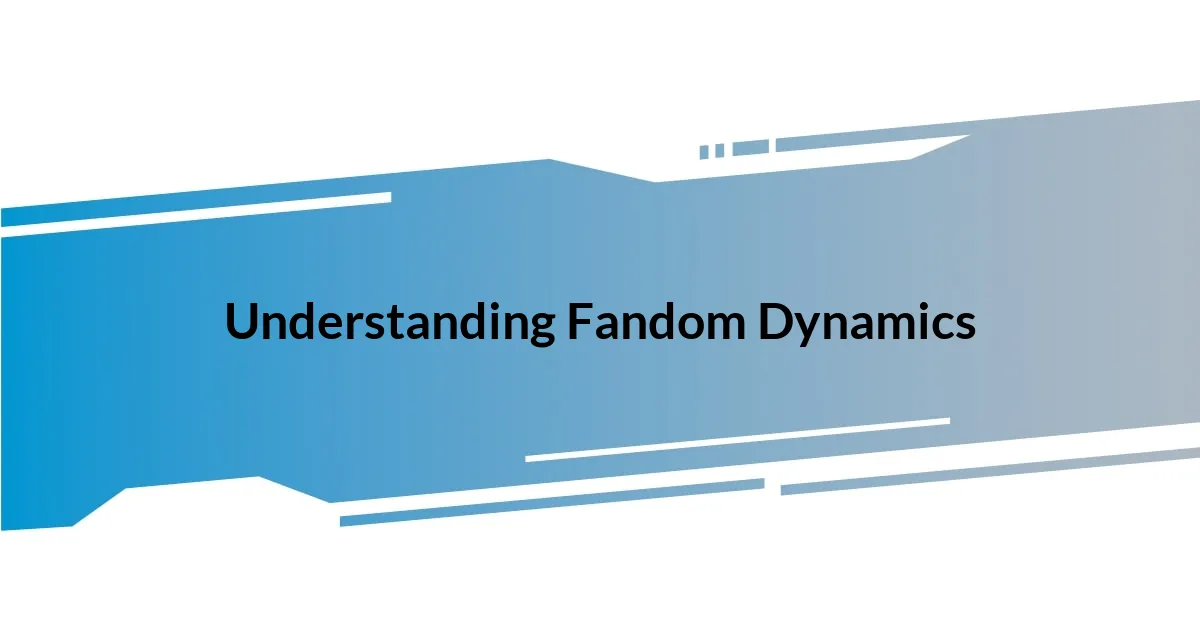
Understanding Fandom Dynamics
Fandom dynamics are often a reflection of human nature itself—think about it. When you find yourself engrossed in a series, whether it’s a show, movie, or book, the community that forms around it can amplify your feelings. I still remember the thrill I felt after finishing a captivating series, only to discover a world of online discussions and fan art. That moment of connection made me realize how deeply intertwined our identities can become with the fandom we choose to be a part of.
Emotions play a huge role in these dynamics—laughter, anger, joy, or even heartbreak. Have you ever encountered a heated debate about a character’s motives? I have. It wasn’t just a discussion; it was a battle of personal beliefs shaped by how we relate to the story and its characters. Those interactions can ignite passionate bonds or, unfortunately, create rifts among passionate fans.
Navigating this intricate web can sometimes feel overwhelming. When I faced friction with fellow fans over opposing views, I learned it doesn’t have to end in drama. Instead, it can serve as an opportunity for growth. Approaching these conversations with empathy can foster understanding, transforming conflict into dialogue. Isn’t it interesting how our opposing views can ultimately enrich our experience if we allow them to?
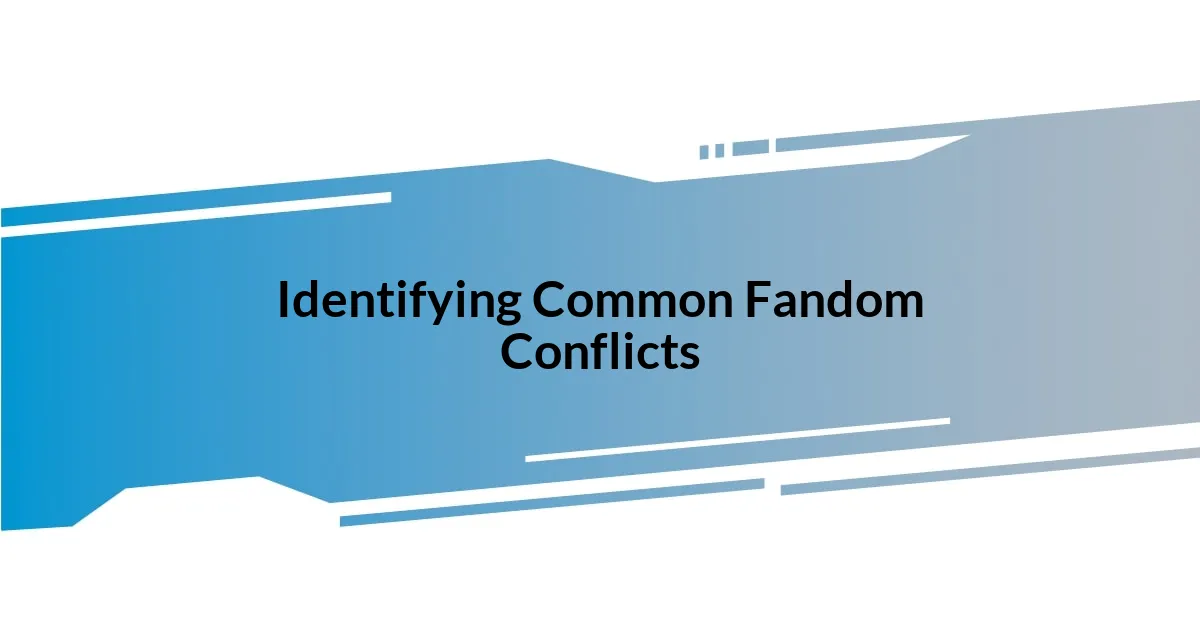
Identifying Common Fandom Conflicts
Identifying conflicts within fandoms often begins with disagreements about character interpretations or plot developments. For instance, I’ve had moments where my love for a villain was met with disdain by a friend, which led to a passionate back-and-forth. It’s fascinating how these debates can stem from our own experiences and emotions, ultimately impacting our view of the story.
Here are some common sources of conflict I’ve noticed in various fandoms:
- Character Loyalty: Fans often have strong attachments to certain characters, leading to fierce debates about their roles or actions.
- Canon vs. Fanon: Disagreements can arise when fans interpret storylines differently, especially when fan-created content conflicts with the original work.
- Shipping Wars: The preference for certain romantic pairings can ignite debates that feel intensely personal and divisive.
- Gatekeeping: Some fans may attempt to control who belongs in a fandom, creating uncomfortable tensions.
- Adaptation Discontent: When beloved books or comics are adapted into films or shows, differing opinions can create schisms among fans.
Reflecting on these conflicts, I’ve realized that understanding the root of our disagreements can turn tension into meaningful discussions. Instead of feeling confrontational, I’ve learned to view these moments as opportunities for deeper connections with fellow fans.
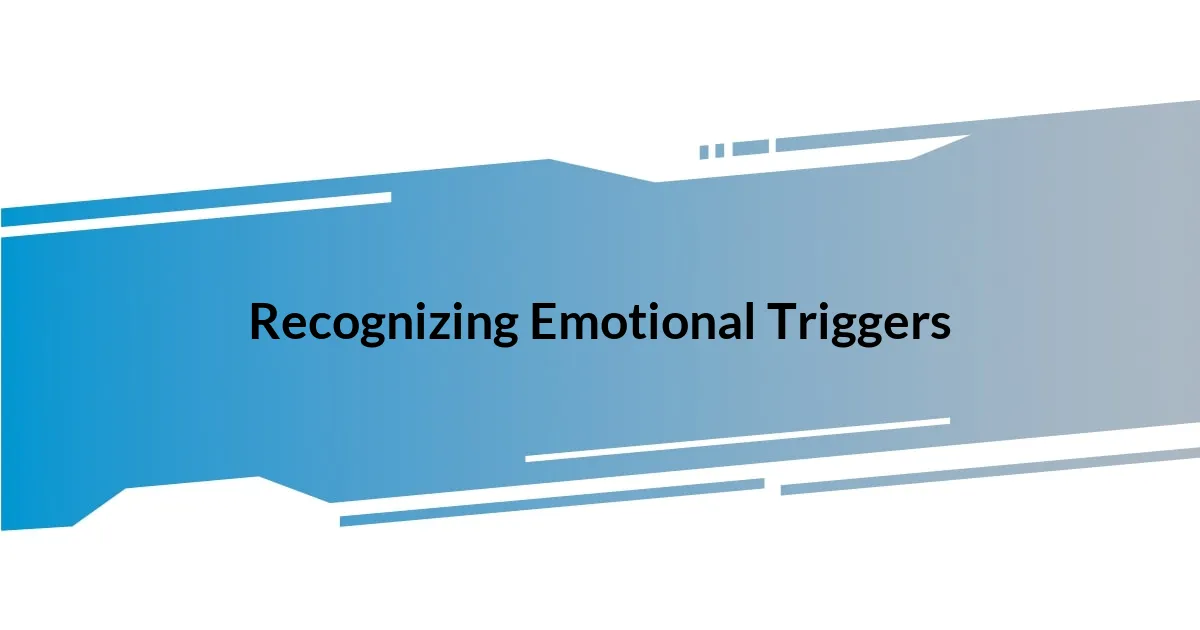
Recognizing Emotional Triggers
Recognizing emotional triggers in fandoms is essential for fostering positive interactions. Personally, I once found myself overly upset during a heated discussion about a character’s fate. It wasn’t just the disagreement; it was the memories tied to my experience that amplified my emotions. I realized that the deeper my connection to a character, the more vulnerable I felt in conversations about them. This awareness helped me understand that my emotional responses weren’t solely about the debate but rather my own investment in the narrative.
Another impactful moment was when I discovered that certain topics became hot buttons for me. Discussing fan theories often led to frustration, especially when they contradicted my preferred interpretations. It made me realize that my reactions were tied to my fear of invalidation within the community. Recognizing these emotions allowed me to take a step back when discussions became heated, ultimately leading to more respectful exchanges. By acknowledging my triggers, I learned to engage in discussions without feeling defensive.
It’s crucial to bring this awareness to the forefront of fandom engagement. For instance, when I noticed my emotions surfacing during a passionate discussion, I took a moment to breathe and reflect on what was causing that intensity. Was it the fear of being misunderstood? Or perhaps a desire to defend the story that resonated with me? Understanding these emotions not only helped me navigate the conversation with calmer clarity but also fostered healthier dialogue with my fellow fans.
| Emotional Trigger | Impact on Fandom Interaction |
|---|---|
| Character Attachment | Can lead to defensive debates or heated arguments. |
| Fear of Misunderstanding | May prompt overreactions or frustration during discussions. |
| Disagreement on Canon | Creates division and may evoke a sense of elitism among fans. |
| Desire for Validation | Can result in intense reactions when one’s views are challenged. |
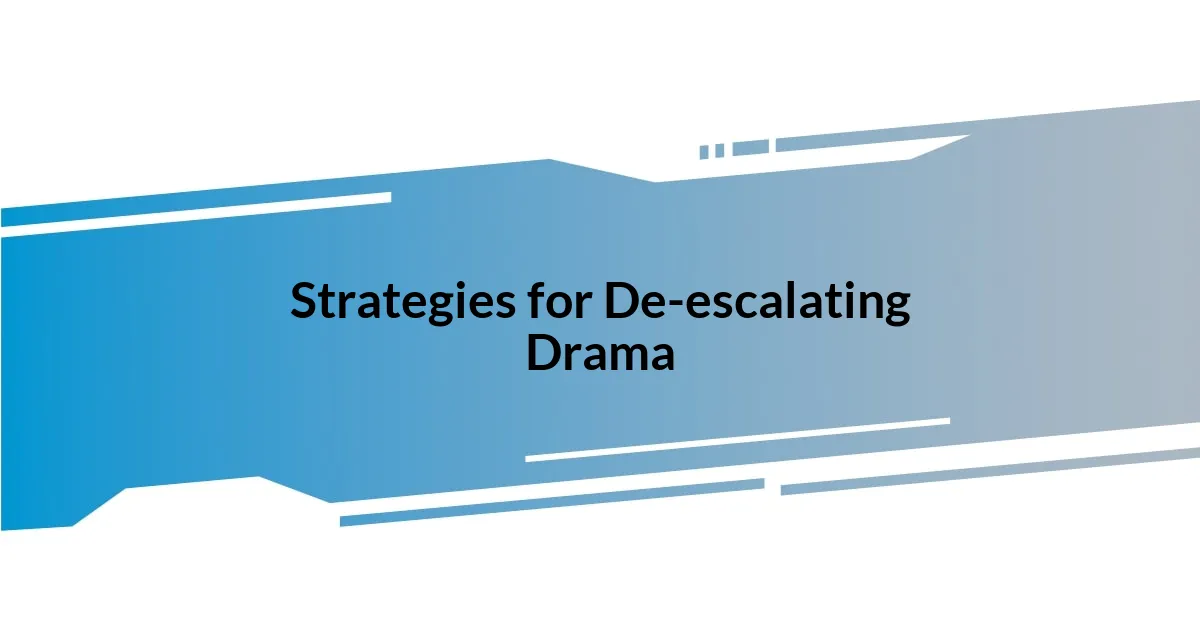
Strategies for De-escalating Drama
When drama erupts in fandom conversations, I’ve found that taking a step back can work wonders. I remember a time when a simple character disagreement spiraled into a heated argument. Instead of adding fuel to the fire, I calmly suggested we refocus on the aspects of the story we both enjoyed. This shift helped lower tensions and reminded us of our shared passions, which is often more important than being right.
Listening actively is another powerful strategy that can de-escalate drama effectively. I’ve witnessed firsthand how a genuine effort to understand someone else’s perspective can transform a conflict. There was an instance when a friend passionately defended a ship I didn’t support. Instead of dismissing their feelings, I asked questions that encouraged them to elaborate on what drew them to that pairing. Their enthusiasm softened my stance, allowing us to appreciate our differing views rather than letting them create a rift.
Finally, acknowledging the emotions at play can shift the dynamics entirely. I recall a discussion where my tone grew sharper as someone criticized a beloved character. Realizing my defensiveness was driven by my affection for this character, I took a moment to express that emotional connection instead. That vulnerability opened the door for a more compassionate dialogue. Have you ever noticed how sharing personal attachments can foster deeper understanding? In my experience, it often builds bridges where conflict once stood.
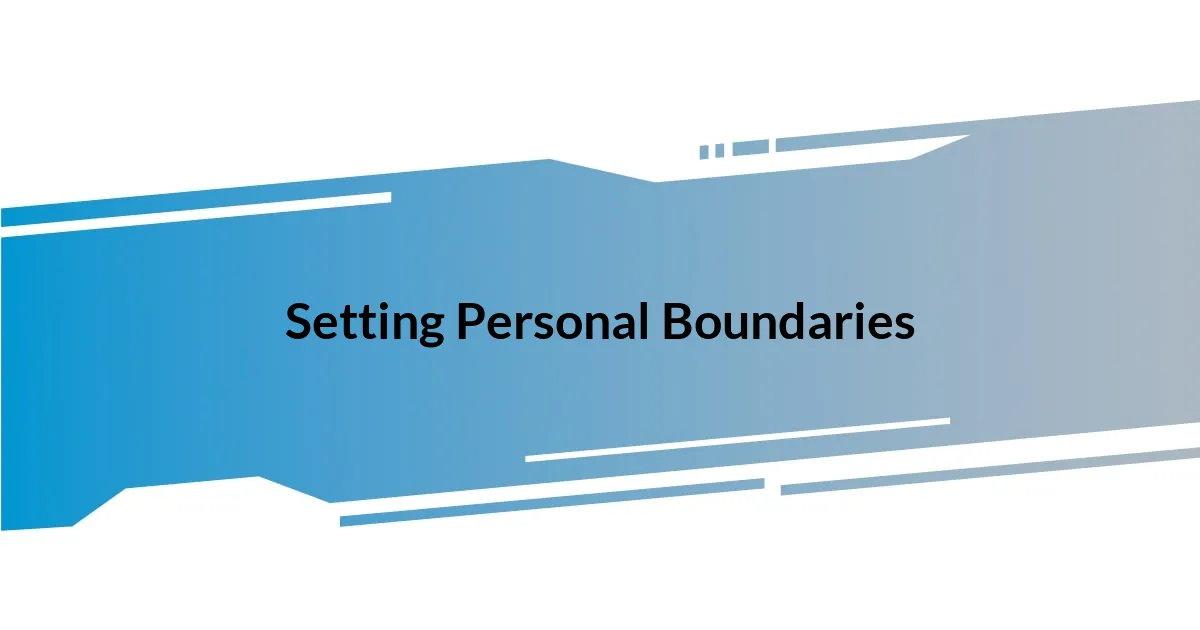
Setting Personal Boundaries
Setting personal boundaries in fandom is crucial for maintaining my mental well-being. I remember a particularly intense online exchange where I felt pressure to participate in debates that drained my energy. It was in that moment of struggle that I realized not every discussion warranted my involvement. Establishing the boundary of disengaging from conflicts that weren’t adding to my joy made a significant difference in my fandom experience.
I’ve learned that recognizing when to step back is just as vital as joining the conversation. There was a time when I felt obligated to respond to every message in a group chat, fearing I’d miss out on important discussions. However, I started prioritizing my space by setting specific times for engagement, and I noticed I enjoyed those interactions more. This shift not only preserved my enthusiasm but also allowed me to contribute meaningfully when I did participate. Have you ever felt overwhelmed by the need to stay engaged? It’s liberating to know you can take a break and come back refreshed.
Moreover, being clear about my boundaries has helped others respect my limits too. I recall sharing with my friends that I preferred to steer clear of heated debates. By doing so, I noticed they began to shift away from contentious topics when I was around, creating a more enjoyable atmosphere. It’s a two-way street; when you voice your needs, others often respond positively. This realization has made me appreciate the importance of setting boundaries, cultivating a space where I can connect authentically without feeling pressured or defensive.
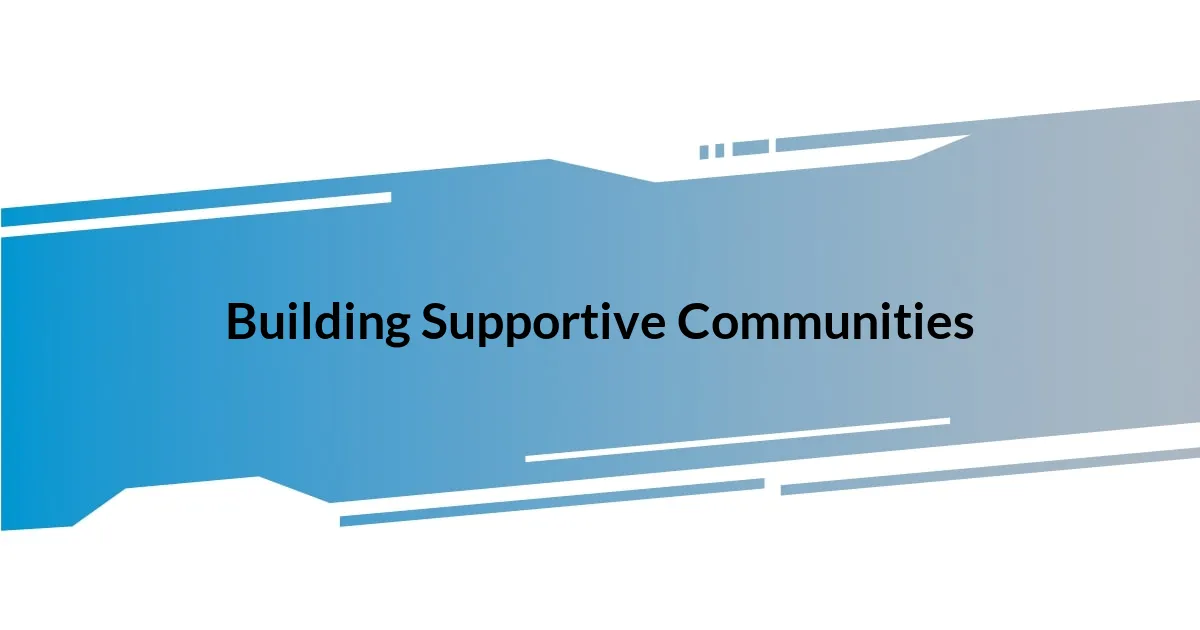
Building Supportive Communities
Building supportive communities means creating spaces where everyone feels valued and respected. I’ve often found that celebrating each other’s passions goes a long way. Once, at a local fandom meetup, I witnessed a group highlight each person’s favorite characters and story arcs. The enthusiasm was contagious, and it fostered an atmosphere where people felt comfortable sharing their unique perspectives without fear of judgment. Have you experienced that kind of positive energy? It truly encourages deeper connections.
Encouragement is another vital element in building a supportive community. I remember a time when a member shared their artwork, feeling nervous about the response. Instead of merely complimenting the piece, I expressed how their style brought new life to a character I adored. Seeing their face light up reminded me that sincere and specific praise can really uplift someone. When we actively invest in each other’s creative journeys, we’re building a foundation of trust and support that can weather any storm.
It’s essential to foster open communication channels too. I typically initiate casual check-ins with my fandom friends, asking how they’re feeling about ongoing discussions or any issues that may arise. Just last month, a gentle nudge prompted someone to express concerns about a recurring topic that often sparked arguments. This conversation led to some group guidelines that helped everyone navigate future discussions more respectfully. How often do we overlook the power of a simple check-in? In my experience, these small acts can make significant shifts in the dynamics of any community.
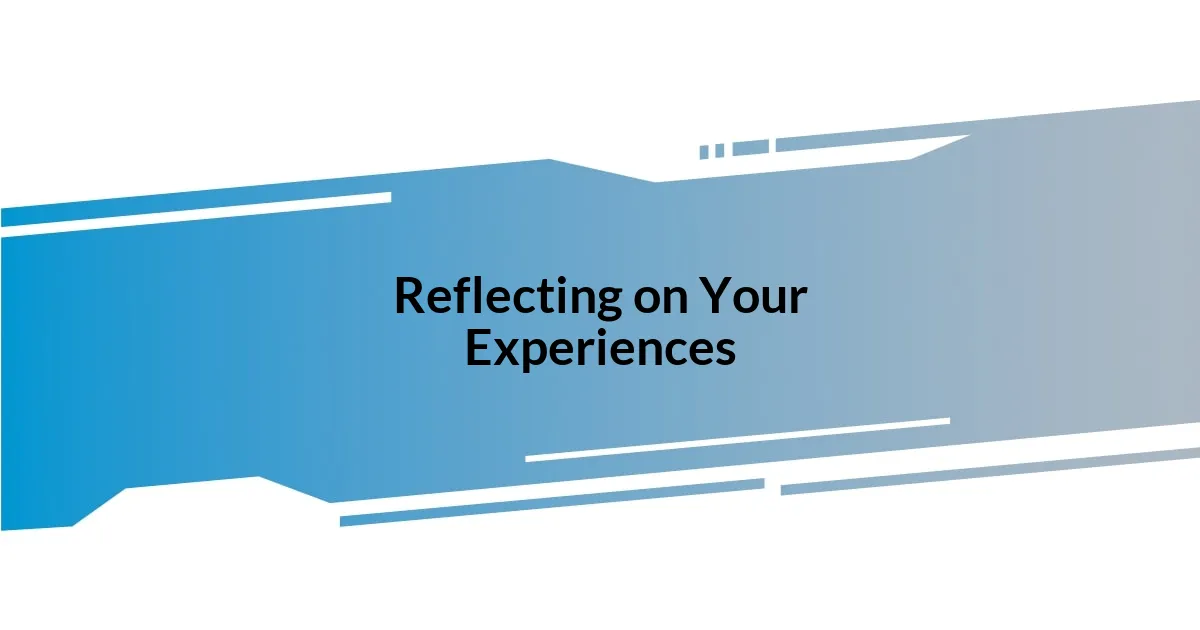
Reflecting on Your Experiences
Reflecting on past experiences in fandom is like holding up a mirror to my growth. I think back to a time when I was overly invested in heated debates, leaving me feeling drained by the toxicity that sometimes permeates these spaces. It’s interesting to realize that stepping away from the chaos allowed me to rediscover the joy that originally drew me to the fandom. Has a conversation ever left you feeling more exhausted than inspired? For me, that was a turning point.
Then there were instances where I truly misunderstood the intent behind someone’s comment. I remember this one online thread where I initially reacted defensively, thinking it was aimed at me. Later, after reflecting and engaging in a calm discussion with that person, I learned they weren’t attacking but sharing a differing opinion. It was humbling, to be honest, and it reinforced the idea that pausing to reflect can open up avenues for understanding and connection. Isn’t it incredible how a moment of reflection can pivot our perspective dramatically?
Lastly, I often journal about my experiences and feelings within the fandom, which has been transformative. One night, after a particularly heated online clash, I poured my thoughts onto the page. What surprised me was not just the clarity that emerged, but the realization of how much emotional weight I was carrying. Writing allows me to process, to identify patterns in my interactions, and I genuinely believe it fosters a clearer mindset moving forward. Have you tried reflecting through writing? It’s amazing how it can help untangle complex feelings and lead to better interactions.